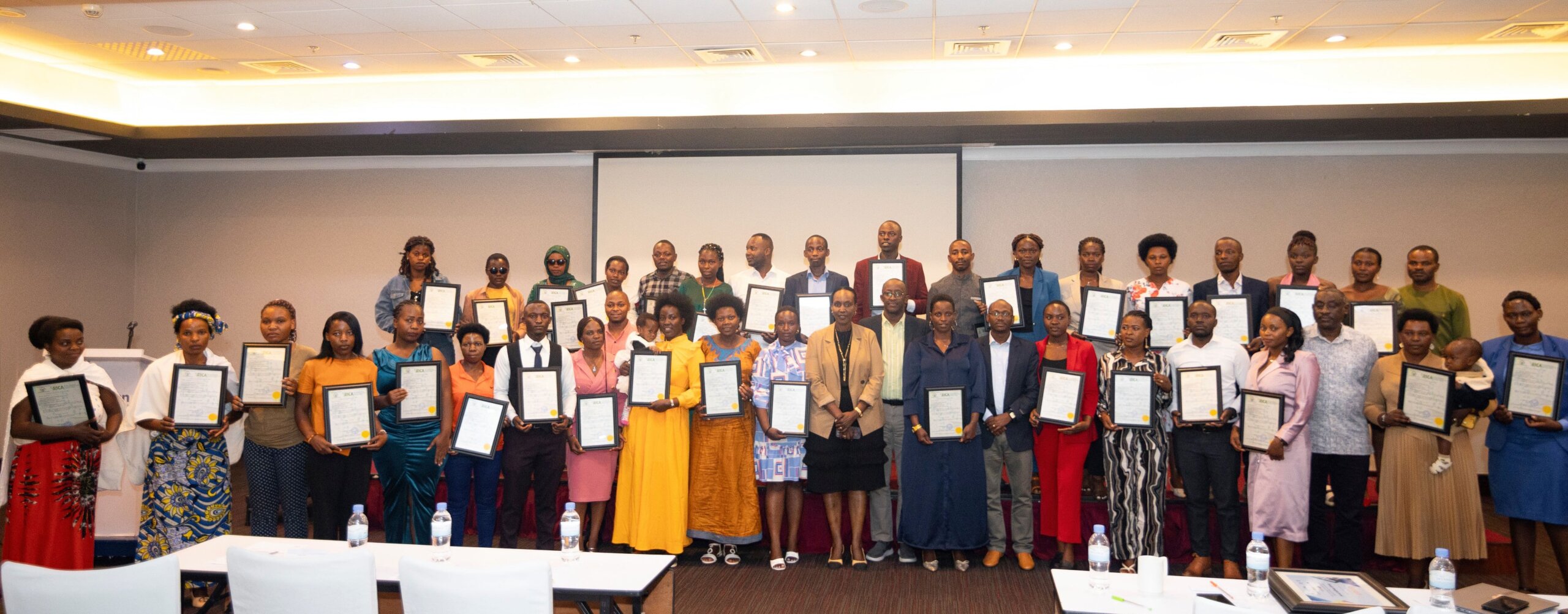Annick Dusengimana (centre) and other participants during the graduation ceremony
Kigali, Rwanda – On 27 June 2025, thirty-five young Rwandans were certified as private meat inspectors after completing an intensive six-month training programme. This initiative was specifically designed to enhance food safety standards and create valuable employment opportunities within Rwanda’s expanding meat industry. Their certification signifies a substantial advance in Rwanda’s efforts to modernise its food systems, while simultaneously addressing youth unemployment by providing practical, market-oriented skills. The programme was delivered by TradeMark Africa through its Value-Added Initiative to Boost Employment (VIBE) programme, in collaboration with the International Trade Centre (ITC), Mastercard Foundation, and the Rwanda Inspectorate, Competition and Consumer Protection Authority (RICA).
Doreca Musenga, the VIBE Programme Manager, stated, “This programme is about creating fulfilling jobs for young people and strengthening a vital link in the country’s food supply chain. We are counting on these graduates to apply the knowledge acquired in the training in ways that protect consumers, support businesses, and ultimately fuel economic growth.”
Previously, meat inspection in Rwanda was primarily carried out by public health officers whose capacity was often stretched thin. The introduction of these newly trained and certified private inspectors will complement the existing system, transforming how hygiene standards are enforced throughout the meat value chain—from slaughterhouses to butcheries. These inspectors will perform a crucial frontline role, ensuring that meat products are clean, safe, and adhere to both national and international regulations. This is anticipated not only to bolster consumer confidence in locally produced meat but also to mitigate food-borne illnesses that could result from contaminated meat.
Annick Dusengimana, a graduate from Busengamana in Huye District, expressed profound gratitude for her participation in the programme. She remarked, “The journey was challenging, but we made it thanks to the support from our trainers, supervisors, slaughterhouse operators, and families. This certification will give us the credibility to contribute to Rwanda’s food sector in a real and meaningful way, and we are thankful to RICA, TradeMark Africa, and the Mastercard Foundation for giving us this opportunity.”

A group photo of the 36 newly graduated Private Meat Inspectors with officials from TradeMark Africa and RICA
The comprehensive six-month training curriculum combined theoretical classroom instruction with practical field attachments in slaughterhouses across Rwanda. During these attachments, trainees acquired hands-on experience under the guidance of expert supervisors. The curriculum encompassed essential technical areas, including detailed meat inspection protocols, stringent hygiene practices, and compliance with national and international food safety standards. These graduates are now qualified to work either independently or in conjunction with local authorities to monitor and enforce food safety compliance. This initiative represents a direct investment in Rwanda’s human capital and serves as a strategic intervention to address youth unemployment.
Robert Mugisha, Director of the Registration and Licensing Unit at RICA, commented, “Food safety is not just a public health issue, but an important development priority. Our mandate is to protect consumers and ensure quality control. Meat, in particular, requires vigilant inspection, and this cadre of private professionals will help us meet the goals of the National Strategy for Transformation (NST 2).”
The successful execution of this programme was made possible through strong collaboration among government institutions, development partners, and private sector stakeholders. Slaughterhouses throughout the country played a pivotal role by hosting trainees during their practical learning period, thereby fostering valuable connections between the learners and potential employers.















